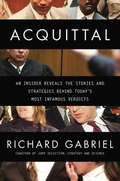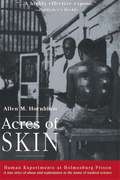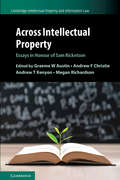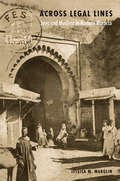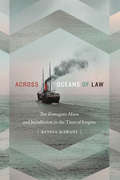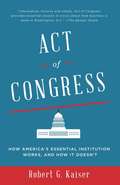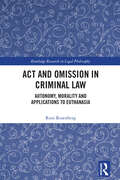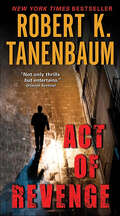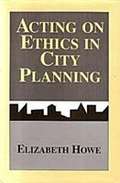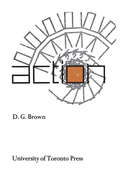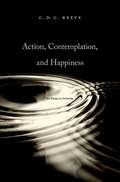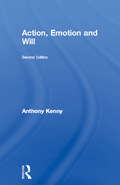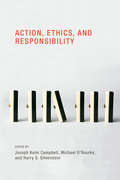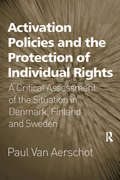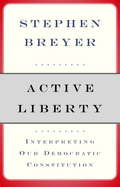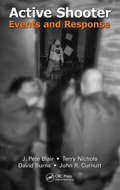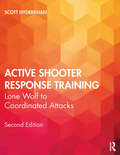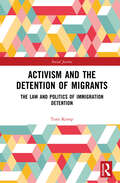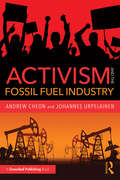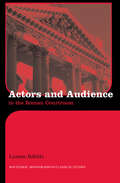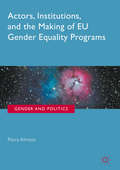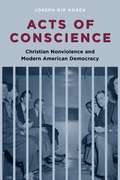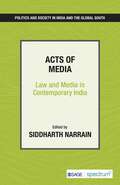- Table View
- List View
Acquittal
by Richard GabrielOctober 3, 1995. The shocking outcome of the O.J. Simpson trial leaves a nation divided. July 5, 2011. Casey Anthony walks free despite being convicted by millions on cable news and social media. There are times when something as supposedly simple as a just verdict rises to the level of cultural touchstone. Often these moments hinge on logic that seems flawed and inexplicable--until now. In Acquittal, leading trial consultant Richard Gabriel explains how some of the most controversial verdicts in recent times came to be. Drawing on more than twenty-eight years of experience, Gabriel provides firsthand accounts of his work on high-profile cases, from the tabloid trials of Casey Anthony, O.J. Simpson, Phil Spector, and Heidi Fleiss to the political firestorms involving Enron and Whitewater. An expert on court psychology and communications, Gabriel offers unique insights on defendants, prosecutors, judges, witnesses, journalists, and the most important people in the room: the jury. Through play-by-play breakdowns of the proceedings, Gabriel reveals the differences between a court of law and the court of public opinion, the convoluted mechanics behind jury selection, strategies for creating a careful balance of evidence and doubt, and the difficulties of providing a fair trial in the digital age. Along the way, Gabriel raises hard questions about not only the legal system but about the possibility of justice in an oversaturated media landscape. The courtroom is a natural theater. The stakes are high. The roles are all too familiar. And there is always the chance of a twist ending. Acquittal is a revelatory guide to this riveting, frustrating, fascinating world--the most unpredictable drama in American life.
Acres of Skin: Human Experiments at Holmesburg Prison
by Allen M. HornblumAt a time of increased interest and renewed shock over the Tuskegee syphilis experiments, Acres of Skin sheds light on yet another dark episode of American medical history. In this disturbing expose, Allen M. Hornblum tells the story of Philadelphia's Holmesburg Prison.
Across Intellectual Property: Essays in Honour of Sam Ricketson (Cambridge Intellectual Property and Information Law #53)
by Megan Richardson Graeme W Austin Andrew F Christie Andrew T KenyonUsing as a starting point the work of internationally-renowned Australian scholar Sam Ricketson, whose contributions to intellectual property (IP) law and practice have been extensive and richly diverse, this volume examines topical and fundamental issues from across IP law. With authors from the US, UK, Europe, Asia, Australia and New Zealand, the book is structured in four parts, which move across IP regimes, jurisdictions, disciplines and professions, addressing issues that include what exactly is protected by IP regimes; regime differences, overlaps and transplants; copyright authorship and artificial intelligence; internationalization of IP through public and private international law; IP intersections with historical and empirical research, human rights, privacy, personality and cultural identity; IP scholars and universities, and the influence of treatises and textbooks. This work should be read by anyone interested in understanding the central issues in the evolving field of IP law.
Across Legal Lines: Jews and Muslims in Modern Morocco
by Jessica M. MarglinA previously untold story of Jewish-Muslim relations in modern Morocco, showing how law facilitated Jews' integration into the broader Moroccan society in which they lived Morocco went through immense upheaval in the nineteenth and early twentieth centuries. Through the experiences of a single Jewish family, Jessica Marglin charts how the law helped Jews to integrate into Muslim society--until colonial reforms abruptly curtailed their legal mobility. Drawing on a broad range of archival documents, Marglin expands our understanding of contemporary relations between Jews and Muslims and changes the way we think about Jewish history, the Middle East, and the nature of legal pluralism.
Across Oceans of Law: The Komagata Maru and Jurisdiction in the Time of Empire (Global and Insurgent Legalities)
by Renisa MawaniIn 1914 the British-built and Japanese-owned steamship Komagata Maru left Hong Kong for Vancouver carrying 376 Punjabi migrants. Chartered by railway contractor and purported rubber planter Gurdit Singh, the ship and its passengers were denied entry into Canada and two months later were deported to Calcutta. In Across Oceans of Law Renisa Mawani retells this well-known story of the Komagata Maru. Drawing on "oceans as method"—a mode of thinking and writing that repositions land and sea—Mawani examines the historical and conceptual stakes of situating histories of Indian migration within maritime worlds. Through close readings of the ship, the manifest, the trial, and the anticolonial writings of Singh and others, Mawani argues that the Komagata Maru's landing raised urgent questions regarding the jurisdictional tensions between the common law and admiralty law, and, ultimately, the legal status of the sea. By following the movements of a single ship and bringing oceans into sharper view, Mawani traces British imperial power through racial, temporal, and legal contests and offers a novel method of writing colonial legal history.
Act Of Congress: How America's Essential Institution Works, And How It Doesn't
by Robert KaiserAn eye-opening account of how Congress today really works—and how it doesn’t— Act of Congress focuses on two of the major players behind the sweeping financial reform bill enacted in response to the Great Crash of 2008: colorful, wisecracking congressman Barney Frank, and careful, insightful senator Christopher Dodd, both of whom met regularly with Robert G. Kaiser during the eighteen months they worked on the bill. In this compelling narrative, Kaiser shows how staffers play a critical role, drafting the legislation and often making the crucial deals. Kaiser’s rare insider access enabled him to illuminate the often-hidden intricacies of legislative enterprise and shows us the workings of Congress in all of its complexity, a clearer picture than any we have had of how Congress works best—or sometimes doesn’t work at all.
Act and Omission in Criminal Law: Autonomy, Morality and Applications to Euthanasia (Routledge Research in Legal Philosophy)
by Roni RosenbergThis book offers an innovative perspective on the critical distinction between acts and omissions in criminal law, a distinction that runs like a defining thread through all types of criminal offenses.While any act that positively causes a prohibited harm is sufficient for a conviction, an omission that causes the very same harm warrants a conviction only when there is a legal duty to act. This fundamental distinction between acts and omissions is not just relevant to criminal law, but it is also deeply rooted in our moral thinking. Thus, it is commonly argued that the difference between acts and omissions is also applicable to the intuitive moral distinction between active euthanasia, forbidden in most countries, and passive euthanasia, permitted in many countries under certain circumstances. Hence, the significance of this book is threefold: First, it offers a comprehensive, coherent, and systematic discussion of the intersections between the philosophical-moral and the legal-criminal aspects of this fundamental topic. Second, it offers a novel rationale for the distinction between acts and omissions, based on the principle of autonomy. Finally, it demonstrates the influences of the theoretical discussion, on the most significant practical questions.This book will be of interest to researchers, academics and policy-makers working in the areas of criminal law, moral philosophy, and bioethics.
Act of Revenge (The Butch Karp and Marlene Ciampi Series #11)
by Robert K. Tanenbaum“Tanenbaum is one lawyer who can write with the best of them.”—Joseph Wambaugh, New York Times bestselling author of Hollywood Hills“Tanenbaum is one hell of a writer.”—New York Post“He has become a master of this genre, and Act of Revenge may be his most exciting and best effort to date.”—Vincent Bugliosi, New York Times bestselling author of Helter SkelterA classic, pulse-pounding thriller from the legendary Robert K. Tanenbaum, Act of Revenge plunges the popular author’s long-running series protagonists, New York City Chief Assistant District Attorney Butch Karp and family, into the lethal heart of a bloody turf war between the Mafia and ruthless Chinese gangsters. An elite member of America’s contemporary crime fiction and thriller royalty—a master whose work stands tall among the novels of John Sanford, Lee Child, Robert Crais, and Brad Meltzer—Tanenbaum entertains magnificently, displaying true storytelling muscle with Act of Revenge.
Action
by D. G. BrownProfessor Brown in this volume discusses one of the most difficult questions in metaphysics, "what is action?" His analysis proceeds along three main lines of thought: the point of view of the agent, the primacy of inanimate action, and the pervasiveness of explanatory insight in the description of action. In the spirit of recent work on practical reasoning, he takes the central fact about human action to be the existence of the point of view, and considers the agent's relation to his own body, Professor Brown argues that the concept of human action is best understood through that of inanimate action, such as the action of wind on trees or an axe on wood. His analysis takes inanimate action as fundamental, and defends it against the popular theory that it is an anthropomorphic projection. Human action is indeed unique. But it is also Professor Brown's thesis that the classical empiricist search for the brute fact of our own agency yields no more than incidental insights into its nature; introspection does not replace the analysis of human action.The analysis in this essay caters for inanimate action as well as for the uniqueness of human action. The key to an analysis complex enough to cover both is the notion of "attributability," which Professor Brown regards as providing "an Aristotelian extension of a Humean approach to causation." Explanation by reference to the soul exploits the point of view of the rational agent. In this way, both human and inanimate action are exhibited as natural phenomena the descriptions of which are pervaded by explanatory insight.The book as a whole gives an account of action in which the peculiarities of human action find their place in nature. It does not enter on questions of ethics, but remains with concepts common to morality, psychology, and history. There are incidental discussions of deliberation, psychokinesis, casual necessity, the agent's knowledge of his action, and responsibility. Here is a controversial theory of action supported by careful argument. Professor Brown's writing is both ambitious in scope and attentive to conceptual detail, and offers a valuable contribution to one of the liveliest contemporary debates in philosophy.
Action, Contemplation and Happiness: An Essay on Aristotle
by Reeve C. D. C.The notion of practical wisdom is one of Aristotles greatest inventions. It has inspired philosophers as diverse as Martin Heidegger, Hans-Georg Gadamer, Elizabeth Anscombe, Michael Thompson, and John McDowell. Now a leading scholar of ancient philosophy offers a challenge to received accounts of practical wisdom by situating it in the larger context of Aristotles views on knowledge and reality. That happiness is the end pursued by practical wisdom is commonly agreed. What is disputed is whether happiness is to be found in the practical life of political action, in which we exhibit courage, temperance, and other virtues of character, or in the contemplative life, where theoretical wisdom is the essential virtue. C. D. C. Reeve argues that the dichotomy is bogus, that these lives are in fact parts of a single life, which is the best human one. In support of this view, he develops innovative accounts of many of the central notions in Aristotles metaphysics, epistemology, and psychology, including matter and form, scientific knowledge, dialectic, educatedness, perception, understanding, political science, practical truth, deliberation, and deliberate choice. These accounts are based directly on freshly translated passages from many of Aristotles writings. "Action, Contemplation, and Happiness" is an accessible essay not just on practical wisdom but on Aristotles philosophy as a whole.
Action, Emotion and Will: 1963 Edition
by Anthony Kenny Dr Anthony KennyAction, Emotion and Will was first published in 1963, when it was one of the first books to provoke serious interest in the emotions and philosophy of human action. Almost forty years on, Anthony Kenny's account of action and emotion is still essential reading for anyone interested in these topics.The first part of the book takes an historical look at the emotions in the work of Descartes, Locke and particularly Hume. In the second part, Kenny moves on to discuss some of the experimental work on the emotions by 20th Century psychologists like William James. Separate chapters cover feelings, motives, desire and pleasure. This edition features a brand new preface by the author.
Action, Ethics, and Responsibility (Topics in Contemporary Philosophy)
by Michael O'Rourke Joseph Keim Campbell Harry S. SilversteinLeading philosophers explore responsibility from a variety of perspectives, including metaphysics, action theory, and philosophy of law.Most philosophical explorations of responsibility discuss the topic solely in terms of metaphysics and the "free will" problem. By contrast, these essays by leading philosophers view responsibility from a variety of perspectives—metaphysics, ethics, action theory, and the philosophy of law. After a broad, framing introduction by the volume's editors, the contributors consider such subjects as responsibility as it relates to the "free will" problem; the relation between responsibility and knowledge or ignorance; the relation between causal and moral responsibility; the difference, if any, between responsibility for actions and responsibility for omissions; the metaphysical requirements for making sense of "collective" responsibility; and the relation between moral and legal responsibility. The contributors include such distinguished authors as Alfred R. Mele, John Martin Fischer, George Sher, and Frances Kamm, as well as important rising scholars. Taken together, the essays in Action, Ethics, and Responsibility offer a breadth of perspectives that is unmatched by other treatments of the topic.ContributorsJoseph Keim Campbell, David Chan, Randolph Clarke, E.J. Coffman, John Martin Fischer, Helen Frowe, Todd Jones, Frances Kamm, Antti Kauppinen, Alfred R. Mele, Michael O'Rourke, Paul Russell, Robert F. Schopp, George Sher, Harry S. Silverstein, Saul Smilansky, Donald Smith, Charles T. Wolfe
Activation Policies and the Protection of Individual Rights: A Critical Assessment of the Situation in Denmark, Finland and Sweden
by Paul Van AerschotIn Denmark, Finland and Sweden the evolution of administrative law, including social welfare law, has been marked by a shift towards a stronger protection of the recipient's individual rights. The adoption of activation policies targeting recipients of social assistance has highlighted the tensions between decision-making concerning the implementation of these policies and the legislative efforts to promote the realisation of individual rights in the field of social welfare. An examination of the legislation in question and its implementation conditions shows that the realisation of individual rights is subordinated to the pursuit of organisational and other objectives. The findings of the study are used to formulate proposals for the promotion of individual rights based on the Nordic egalitarian model of citizenship. This critical assessment of activation policies should be of broad international appeal. It will be of interest to researchers in social policy, as well as those concerned with protection of rights.
Active Citizenship and Disability
by Andrew Power Janet E. Lord Allison S. DeFranco Andrew Power Janet E. Lord Allison S. DefrancoThis book provides an international comparative study of the implementation of disability rights law and policy focused on the emerging principles of self-determination and personalisation. It explores how these principles have been enshrined in the United Nations Convention on the Rights of Persons with Disabilities and how different jurisdictions have implemented them to enable meaningful engagement and participation by persons with disabilities in society. The philosophy of 'active citizenship' underpinning the Convention - that all citizens should (be able to) actively participate in the community - provides the core focal point of this book, which grounds its analysis in exploring how this goal has been imagined and implemented across a range of countries. The case studies examine how different jurisdictions have reformed disability law and policy and reconfigured how support is administered and funded to ensure maximum choice and independence is accorded to people with disabilities.
Active Liberty
by Stephen BreyerWhat role should courts play in a modern democracy? How should fundamental provisions of a democratic constitution be interpreted? These questions have divided constitutional theorists and those responsible for interpreting and applying constitutional law including, notoriously, thecurrent U. S. Supreme Court. Justice Breyer is the most prominent liberal voice in the Supreme Court, this book distils his experience of interpreting the U. S. constitution and outlines a general liberal theory of the role of constitutional courts. Breyer argues that the primary role of a democratic constitution is to preserve and encourage 'Active Liberty': citizen participation in shaping government and its laws. The book argues that promoting active liberty requires judicial modesty and deference to legislative bodies; it also requiresthe recognition of the changing needs and demands of the populace. Breyer makes a powerful case against treating constitutions as a static guide for a world that has passed into history. Throughout the book, active liberty is employed as a foundational concept to illuminate the interpretation of key constitutional questions, and recent Supreme Court controversies, such as the scope of free speech and racial equality protection. For this revised, international edition of the book, Justice Breyer extends his discussion of democratic theory to examine topical questions in European constitutional law, including the legitimacy of the European Union, religious freedom under the European Convention on Human Rights.
Active Liberty
by Stephen BreyerA brilliant new approach to the Constitution and courts of the United States by Supreme Court Justice Stephen Breyer.For Justice Breyer, the Constitution's primary role is to preserve and encourage what he calls "active liberty": citizen participation in shaping government and its laws. As this book argues, promoting active liberty requires judicial modesty and deference to Congress; it also means recognizing the changing needs and demands of the populace. Indeed, the Constitution's lasting brilliance is that its principles may be adapted to cope with unanticipated situations, and Breyer makes a powerful case against treating it as a static guide intended for a world that is dead and gone. Using contemporary examples from federalism to privacy to affirmative action, this is a vital contribution to the ongoing debate over the role and power of our courts.From the Trade Paperback edition.
Active Shooter Events and Response
by David Burns John P. Blair Terry Nichols John R. CurnuttThe Columbine tragedy on April 20, 1999 began a new era in law enforcement as it became apparent that the police response to such mass shootings must be drastically altered. By the time the Sandy Hook Elementary School shooting occurred on December 14, 2012, outdated police response strategies had been replaced with new, aggressive tactics used by
Active Shooter Response Training: Lone Wolf to Coordinated Attacks
by Scott HyderkhanActive Shooter Response Training: Lone Wolf to Coordinated Attack, Second Edition, provides expanded and updated training for police and security officers who must respond to an active shooter situation. This manual addresses all facets of preparation and response, from complex logistical organization to collective and individual tactics, as well as special units or special skills tasks. Based on time-tested military training doctrine, the program described here offers a template for agencies of all sizes to offer training that effectively utilizes officers’ available time. Hyderkhan and his expert contributors cover all aspects of the active shooter response (ASR) mission, from risk analysis to logistical planning for mass casualty events. He also addresses medical care and evacuation, reunification procedures, and post-incident investigation. Active Shooter Response Training, Second Edition, provides the tools needed to prevent or mitigate tragedy in our religious congregations, schools, and public places. The book includes a voucher code for a 50% discount off of the companion online library of training videos This book is directed to law enforcement agencies, private security teams, training organizations, police leaders, and individual officers and trainers, in the US and globally. It also has potential as recommended reading in policing courses at the community college and university level.
Activism and the Detention of Migrants: The Law and Politics of Immigration Detention (Social Justice)
by Tom KempThis book is an empirically grounded, critical engagement with the politics of immigration detention and deportation. Focusing on the constitutive tensions and political generativity within the activist practices of the anti-detention movement, this book examines the distinction between representational and post-representational political sensibilities. Representational politics centres on representing the interests of disenfranchised people to the state and public and operates primarily within the regime of immigration law. Post-representational politics focuses on working collaboratively with those in detention, to resist and challenge the deportation system. Since representational politics is the predominant political imaginary of migrant rights campaigning, the book focuses on illustrating and evaluating the role of post-representational politics. The book argues that the concept of post-representational politics is important for understanding and participating in radical opposition to state racism. This argument rests on the expanded possibilities it motivates of engaging with and resisting institutions that are poised to co-opt resistance; the attention it fosters to the situated power dynamics of political activities that collaborate with imprisoned people; and its sensitivity to the politically and conceptually generative capacities of everyday, embodied practices of resistance. To make this argument, this book employs innovative methodology to illuminate and engage with the practice-based thinking of activist movements about the concepts of solidarity, hospitality, witnessing and accountability. This book will be of interest to scholars and activists with interests in socio-legal studies of immigration and refugee law, as well as others in social movement studies, critical legal studies, border criminology and critical theory.
Activism and the Fossil Fuel Industry
by Johannes Urpelainen Andrew CheonIn less than a decade, activism against the fossil fuel industry has exploded across the globe. While environmentalists used to focus on legislative goals, such as carbon emissions trading or renewable energy policies, today the most prominent activists directly attack the fossil fuel industry. This timely book offers a comprehensive evaluation of different types of activism, the success and impact of campaigns and activities, and suggestions as to ways forward. This book is the first systematic treatment of the anti-fossil fuel movement in the United States. An accessible and readable text, it is an essential reference for scholars, policymakers, activists, and citizens interested in climate change, fossil fuels, and environmental sustainability. The entire book or chapters from it can be used as required or supplementary material in various courses at the undergraduate and graduate level. As the book is not technically challenging but contains a comprehensive review of climate change, fossil fuels, and the literature on environmental activism, it can be used as an accessible introduction to the anti-fossil fuel campaign across disciplines.
Actors and Audience in the Roman Courtroom (Routledge Monographs In Classical Studies)
by Leanna BablitzWhat would you see if you attended a trial in a courtroom in the early Roman empire? What was the behaviour of litigants, advocates, judges and audience? It was customary for Roman individuals out of general interest to attend the various courts held in public places in the city centre and as such the Roman courts held an important position in the Roman community on a sociological level as well as a letigious one. This book considers many aspects of Roman courts in the first two centuries AD, both civil and criminal, and illuminates the interaction of Romans of every social group. Actors and Audience in the Roman Courtroom is an essential resource for courses on Roman social history and Roman law as a historical phenomenon.
Actors, Institutions, and the Making of EU Gender Equality Programs (Gender and Politics)
by Petra AhrensThis book is an actor-centred sociological study of the EU-level processes that produce gender equality policy. Based on interviews and documentary analysis, the study unpacks the process of the "Roadmap for Equality between Women and Men 2006-2010" to explain the different roles of actors in the making of EU gender equality policies. By analysing policy processes inside institutions and among institutions, the study focuses on the internal working logics in and between EU-level institutions. It highlights the shifting spaces, openings, and constraints for the development of gender equality policies. Concentrating on EU policy programmes helps shed light on the invisible aspects of EU gender equality policy-making and how this process changed regarding actors, structure and content in the late 2000s. This book will be of interest to students and scholars in the fields of EU politics, gender politics, and public policy, as well as to institutional and non-governmental actors in the area of gender politics in Europe and the working of EU politics.
Acts of Conscience: Christian Nonviolence and Modern American Democracy (Columbia Studies in Contemporary American History)
by Joseph Kip KosekIn response to the massive bloodshed that defined the twentieth century, American religious radicals developed a modern form of nonviolent protest, one that combined Christian principles with new uses of mass media. Greatly influenced by the ideas of Mohandas Gandhi, these "acts of conscience" included sit-ins, boycotts, labor strikes, and conscientious objection to war. Beginning with World War I and ending with the ascendance of Martin Luther King Jr., Joseph Kip Kosek traces the impact of A. J. Muste, Richard Gregg, and other radical Christian pacifists on American democratic theory and practice. These dissenters found little hope in the secular ideologies of Wilsonian Progressivism, revolutionary Marxism, and Cold War liberalism, all of which embraced organized killing at one time or another. The example of Jesus, they believed, demonstrated the immorality and futility of such violence under any circumstance and for any cause. Yet the theories of Christian nonviolence are anything but fixed. For decades, followers have actively reinterpreted the nonviolent tradition, keeping pace with developments in politics, technology, and culture. Tracing the rise of militant nonviolence across a century of industrial conflict, imperialism, racial terror, and international warfare, Kosek recovers radical Christians' remarkable stance against the use of deadly force, even during World War II and other seemingly just causes. His research sheds new light on an interracial and transnational movement that posed a fundamental, and still relevant, challenge to the American political and religious mainstream.
Acts of Media: Law and Media in Contemporary India
by Siddharth NarrainActs of Media seeks to consolidate a field of multidisciplinary work around media technologies that intersects with legal scholarship. This volume brings together contributions from leading academics, lawyers, researchers and policy experts about contemporary India and Sri Lanka. The approaches to law and media taken in this volume challenge us to think outside of traditional disciplinary descriptions. Rather than approaching the law as being outside of, and constantly catching up with the media, the contributors of this book view law and media as being deeply intertwined. The chapters in this volume address the relationship between law and media through different entry points---disputes over media and information systems shaping law, theories of law that incorporate media forms, and law and media co-producing trials. The multidisciplinary nature of this book has facilitated a rich and productive conversation among legal scholars, researchers and lawyers from disciplines such as constitutional law, law and technology, media and cinema studies, legal anthropology and political science.
